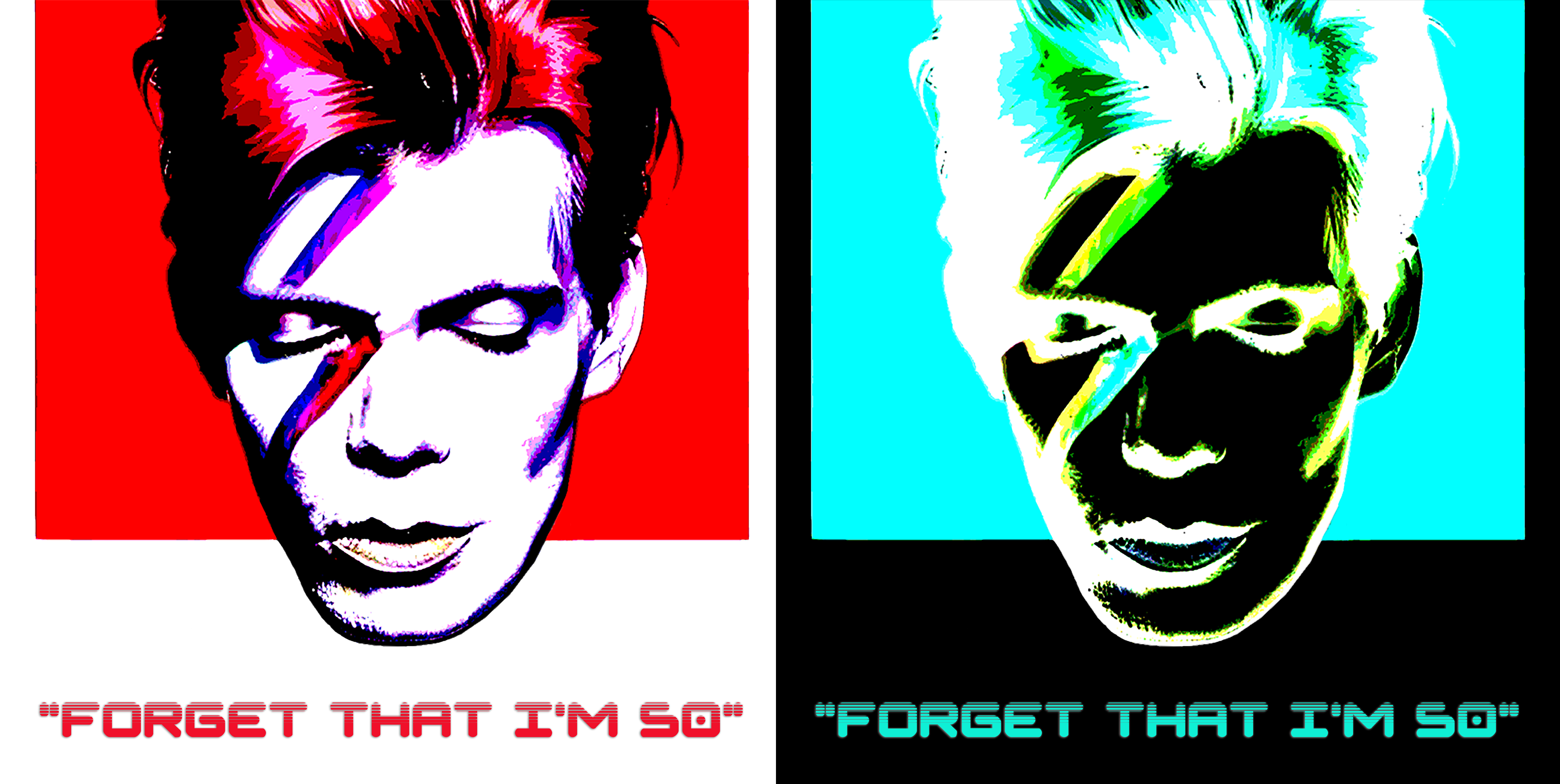By Keith Walsh
In 1973, an American television show, The Six Million Dollar Man, was released on the ABC network. Based on the novel by Martin Caidin, it tells the story of an astronaut who is destroyed in a rocket crash, only to be brought back to life with lots of cybernetic parts added to his body. The tagline in the show’s intro? “We can rebuild him – we have the technology – we can make him better than he was .”
Also in 1973, the newly-minted superstar David Bowie was riding high on the success of his album The Rise And Fall Of Ziggy Stardust And The Spiders From Mars (playing “the wild mutation”). The following album, Aladdin Sane, was written and recorded in a hurry in a year filled with U.S. tour dates. The lyrics are around the titular character’s experiences coming unhinged while being schmoozed and glad-handled by all sorts of admirers, lovers, sycophants, cocaine dealers, record execs, and other unsavory characters. The protagonist is seen to be falling apart, due to the excesses of massive consumption and hubris.
Now, on the 50th Anniversary of its release, studio whiz (and Bowie tribute artist extraordinaire) has recruited some of his very talented comrades to reproduce Aladdin Sane. And you know what? They rebuilt it, they made it better than it was. I write this with hesitation, as it’s not really possible to make a Bowie album better than Bowie did. But Forget That I’m 50 – David Bowie’s ‘Aladdin Sane’ Remade, Remodeled is a better album in the sense that it’s filled with creative, refreshing new takes on an album that’s so familiar that it’s no longer novel. Forget That I’m 50 remedies that. Note that the title is a line from the album’s song “Cracked Actor.”
Bowie put out lots of albums in the 70s, in an amazing display of productivity. The original Aladdin Sane is a groundbreaking glam rock exercise, with plenty of musical and lyrical references to the Rolling Stones, including a cover of “Let’s Spend The Night Together.” But the original Aladdin Sane has an urgent, rushed feel, being very much the product of someone overstimulated, and most of it was recorded in a month between legs of what must have been an exhausting U.S. tour. In contrast, these new interpretations are realized from a position of mental wellness and comfort (can we assume?)

Song By Song
Forget That I’m 50 is the first release on the new Harmony Records, a collaboration with his friend (whom he calls mentor) David Chatfield. Shah-Tayler produced or executive produced six of the 10 tracks. In addition to benefitting from all sorts of modern instruments and devices, decades of perspective allow the interpreters to experiment and play with the compositions.
The opening track, “Watch That Man” is a spirited, truly rock-and-roll interpretation by Gene Micofsky, who also happens to be the guitarist in Shah-Tayler’s Bowie tribute The Band That Fell To Earth. This version kicks ass.
“Aladdin Sane” is the next track. I asked Shah-Tayler who would be taking on the daunting task of reproducing or playing at the piano solos by Michael Garson on the title track? “We made the songs mostly piano free,” he told me. “Deliberately so. (My contributions at least).” As it turns out, the title track’s tribute is done by Beck Black, with a groovy alt rock sound, including nicely processed guitars and some harp and sitar-like sounds and of course Beck’s lovely vocals. It’s a dreamy version that does justice to the original in refreshing new ways. (My complete interview with Julian Shah-Tayler, including details of his new collaboration with the Mike Garson, is here.
“Aladdin Sane” is followed by Darwin’s understated version of “Drive In Saturday.” It’s a mellow, reflective take, with sweet background vocals by Ash Reyes. The dominant presence of a Fender Rhodes sound (on a Nord keyboard, by Mike Berg) is a very effective touch. I had the chance to ask Darwin about his approach to taking on such a formidable artistic task. “I didn’t want to do it,” he writes. “Bowie is so far away from me that it felt I had nothing to offer. But Julian is persistent and encouraged me to do it so I did. I often like to strip things down to their simpler states and that’s how I approached this one.”
Natalie Wild’s “Panic In Detroit” keeps the rocking spirit of the original, with some jungle toms keeping things moving, as well as shakers, just like the original. It’s nice to hear female interpretations of Bowie, and Natalie’s voice is up to the task. Then comes “Cracked Actor,” a souled up version by Sumthing Strange. The arrangement is cool, dense and weird. Next up is Human Drama’s “Time,” sounding quite melancholy, with only vocals and guitars for the most part, then subtle synths strings. It’s a folk version, essentially.
Former Teen’s version of “Prettiest Star” is by far the artsiest track on the album, with vintage electronic percussion (not forgetting a vibraslap), some prominent synth bass pulses, fey vocals and strange synth piano at the end. I’m not finding much out about Former Teen, (and a Google of the words yields some sad stories). The Stone’s cover-of-a-cover “Let’s Spend The Night Together” is done in a dark fashion by Jawnee Danger. It’s the most radical deconstruction on the album, taking a sharp departure from any of the melodies that Bowie played with on his version.
Gene Loves Jezebel takes a swing at “Jean Genie,” with its Bo Diddley vibes, with vocals from Michael Aston, and harmonica from Shah-Tayler. It’s a harder, brighter version than the original, returning the song to its references, including an unexpected quoting of The Beatle’s “Love Me Do.”
Finally is Shah-Tayler’s “Lady Grinning Soul,” which features the cool electronic vibes we’ve come to expect. He assures me that the quite interesting string sounds are generated on guitar. “I use synth guitars sometimes,” he tells me. “There’s something Bowie-like in his voice, akin to the Plastic Soul era of Bowie’s career that started in the mid 70s. “I didn’t deliberately do a Bowie on that song,” Shah-Tayler tells, me, “but obviously my voice lends itself quite well to sounding like him, but it wasn’t a deliberate choice. I sang it how I would sing it, and that’s how it came out.”
With Aladdin Sane expertly reinterpreted for the 50th anniversary, in 2024 Diamond Dogs turns 50, then there’s Young Americans (1975), and Station To Station (1976). I asked Shah-Tayler if we could expect a similar treatment for these three albums in the coming years? For the answer to that, check out my complete interview with Shah-Tayler at www.popularculturebeat.com
Julian Shah-Tayler On Bandcamp
Julian Shah-Tayler Reveals Perspectives On Bowie (April 2023 Q and A)
What’s Your Name? Julian Shah-Tayler Interview on Synthbeat, 2020
finis
